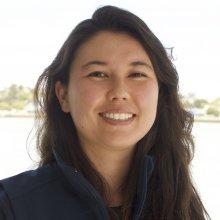
Sarah Hu
Tell us about your work/research. What kinds of things do you do?
My research is focused on answering what species of single-celled microbial eukaryotes are present in an environment and what are they doing. Microbial eukaryotes are capable of diverse nutritional roles (including autotrophy, heterotrophy, and mixotrophy). Therefore, understanding their biology and ecology provides us a more complete view of how marine food webs operate. To capture what species are present in naturally occurring populations, I use molecular methods to extract DNA or RNA. This genetic information can be used to obtain species identification or information on metabolic pathways. Additionally, I combine this molecular approach with incubation experiments to measure the activity of microbial eukaryotic populations (i.e. heterotrophic feeding on bacteria).
What sparked your initial interest in your career?
As an undergraduate, I took a course in aquatic sciences which had a fieldwork component. I loved learning about basic research skills and techniques in the classroom and then being able to immediately apply them in a local stream environment! This sparked my initial passion for research (and data collection!).
Who influenced you or encouraged you the most?
I am most encouraged by (and inspired by) the people I work with. I get to work with amazing people every day.
What element of your work/study do you think is the most fascinating?
Every day I get to learn something new about microbial eukaryotes - their physical forms, metabolisms, and behaviors never cease to surprise me.
What other jobs led you to your current career?
Before my current position and graduate school, I was an intern and research technician for various labs. One of my internships was studying bacteria associated with shellfish populations, which exposed me to research with a microbiology focus. I also worked as a scientific diver, surveying eel grass beds and invertebrate populations in coastal areas.
What are your degrees and certifications?
B.S. Aquatic and Fishery Sciences - University of Washington 2011
Ph.D. in Marine Environmental Biology - University of Southern California 2018
What are your hobbies?
Outside of work, you'll likely find me cycling, running, swimming, or exploring museums.
How did you get involved with the Nautilus Exploration Program?
I am a postdoctoral fellow with Julie Huber, a lead scientist for the expedition.
What advice would you give someone who wants to have a career like yours?
Find people you consider role models to work with. If you have an idea, pursue it. And remember that there are a lot of options and opportunities within the field, so explore.
Expeditions
Sarah participated in the following Ocean Exploration Trust expeditions:
